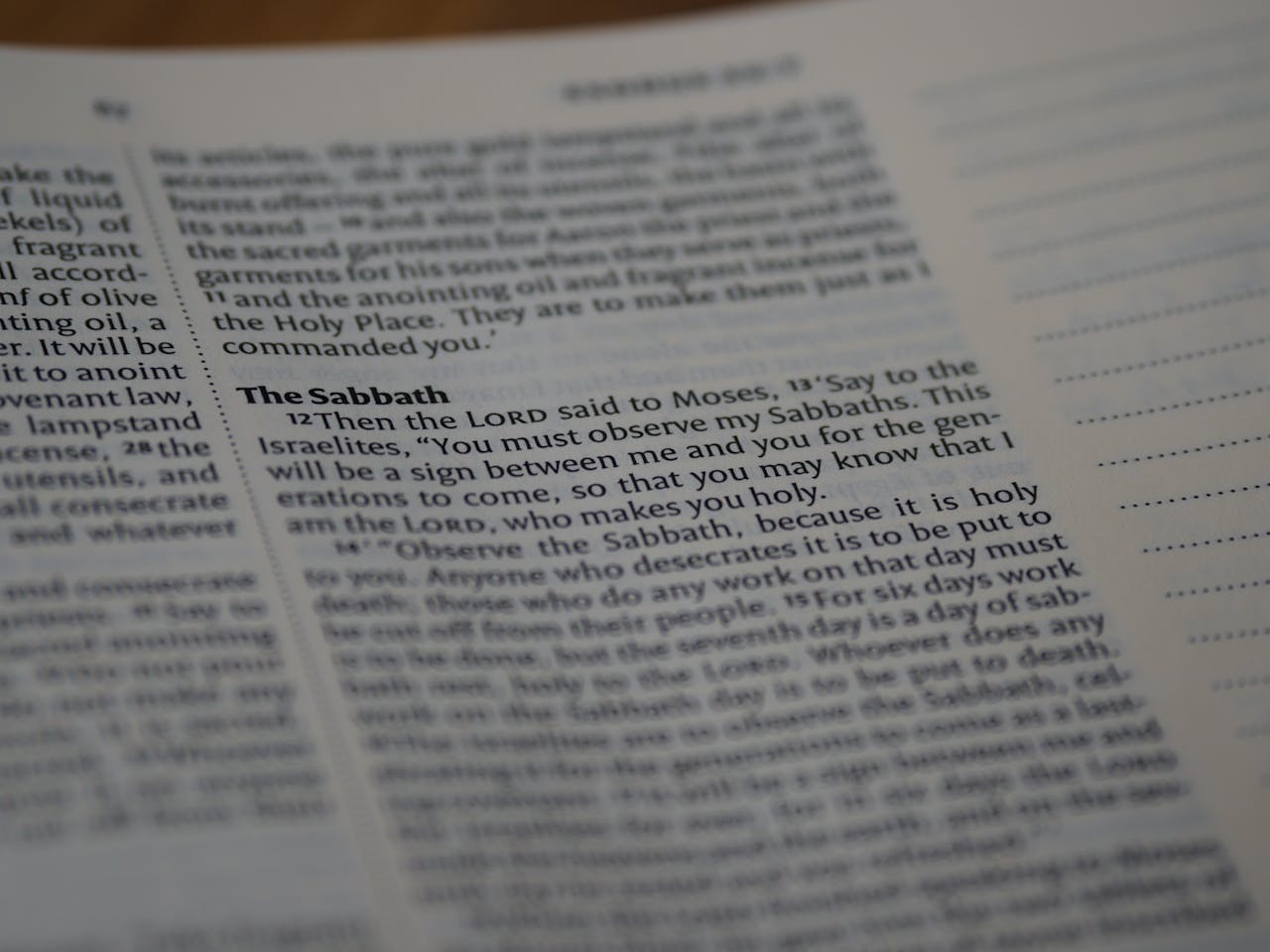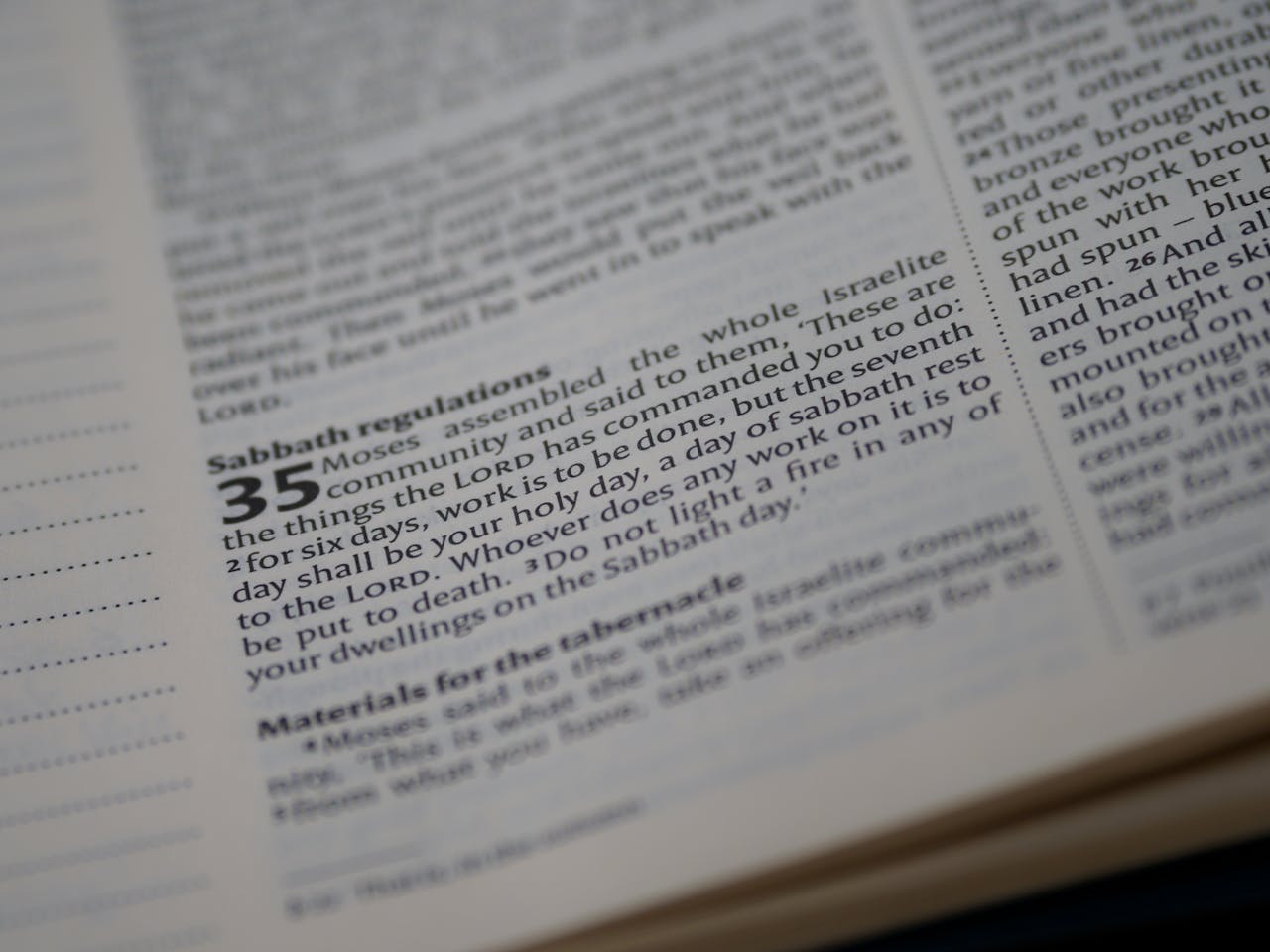80 Biblical Facts That Prove the 7th Day of the Week is the True Sabbath
The question of which day is the true Sabbath has stirred much debate among Christians. However, the Bible is clear on this subject, providing ample evidence that the seventh day (Saturday) is the Sabbath instituted by God. Here are 80 biblical facts to answer these important questions, proving that the seventh day is the true Sabbath meant to be observed by all believers.
- God created the Sabbath on the seventh day of creation (Genesis 2:2-3).
“By the seventh day God had finished the work He had been doing; so on the seventh day He rested from all His work. Then God blessed the seventh day and made it holy.”
- God rested on the seventh day, setting an example for mankind (Genesis 2:3).
God’s rest signifies the completion of creation and sets a divine precedent for the Sabbath.
- The Sabbath was made holy by God Himself (Genesis 2:3).
Only God has the authority to declare something holy, and He did this for the seventh day.
- The Sabbath was made for man (Mark 2:27).
Jesus declared, “The Sabbath was made for man, not man for the Sabbath.” It is a gift from God for all humanity.
- The Sabbath commandment is part of the Ten Commandments (Exodus 20:8-11).
The fourth commandment says, “Remember the Sabbath day by keeping it holy…” It is placed within the moral law, not a ceremonial law.
- The Ten Commandments were written by the finger of God (Exodus 31:18).
These commandments, including the Sabbath, were directly written by God, showing their permanence.
- The seventh day is the Sabbath of the Lord (Exodus 20:10).
The Bible does not say the first day or any other day—it specifically states the seventh day is the Sabbath.
- The Sabbath is a sign between God and His people (Exodus 31:13).
It identifies those who belong to God and follow His law.
- The Sabbath is for all generations, not just the Jews (Exodus 31:16-17).
It is an everlasting covenant meant for all who worship God.
- God reaffirmed the seventh-day Sabbath in the wilderness (Exodus 16:26).
Manna fell for six days, but none fell on the seventh day, proving God’s consistency in upholding the Sabbath.
- Breaking the Sabbath commandment is a sin (Exodus 31:14).
Deliberate desecration of the Sabbath shows disobedience to God’s law.
- Jesus kept the Sabbath day (Luke 4:16).
It was His custom to worship on the seventh day, affirming its importance.
- The apostles continued to observe the Sabbath after Christ’s ascension (Acts 13:42-44).
Paul and the apostles preached on the Sabbath to both Jews and Gentiles.
- The Sabbath was kept in the early Christian Church (Acts 18:4).
Paul reasoned in the synagogue every Sabbath, converting Jews and Greeks alike.
- The Sabbath is not a shadow of things to come (Colossians 2:16-17).
While certain ceremonial practices were a shadow, the Sabbath existed long before sin and will endure forever.
- Isaiah prophesied that all flesh will worship on the Sabbath in the New Earth (Isaiah 66:22-23).
The seventh-day Sabbath will continue in eternity.
- The Sabbath points to God’s creative power (Exodus 20:11).
God as Creator is remembered through the Sabbath day, and it is a weekly memorial of His creation.
- Jesus is the Lord of the Sabbath (Matthew 12:8).
If He is the Lord of the Sabbath, that day remains important for His followers.
- The seventh-day Sabbath is a day of rest and worship (Leviticus 23:3).
It is not merely a day of physical rest, but also a holy convocation for worship.
- Sabbath-keeping is part of God’s covenant (Deuteronomy 5:12-15).
The Sabbath commandment ties into God’s covenantal relationship with His people.
- The Sabbath was kept before the giving of the Ten Commandments (Exodus 16:23).
The command to rest on the Sabbath came before Mount Sinai, showing it wasn’t just for Israel.
- The seventh day is linked with God’s identity as Creator (Revelation 14:7).
Those who honor the Creator are called to “worship Him who made the heavens, the earth, the sea, and the springs of water,” referring to the Sabbath.
- The first-day Sunday observance is never commanded in Scripture (Matthew 28:1).
There is no biblical authority for keeping Sunday as the Sabbath.
- The Sabbath was kept by Gentile converts (Acts 13:42-44).
Non-Jews observed the Sabbath, proving it wasn’t just for Israel.
- The Sabbath is a delight (Isaiah 58:13-14).
God calls us to find joy in keeping His Sabbath, not burden.
- Jesus healed on the Sabbath, showing it’s a day for doing good (Mark 3:4).
Acts of mercy and kindness are appropriate on the Sabbath.
- Jesus affirmed that the Sabbath was still valid in the end times (Matthew 24:20).
He told His followers to pray that their flight would not be on the Sabbath.
- The Sabbath is linked to liberation and freedom (Deuteronomy 5:15).
It reminds us of God’s deliverance, not only from Egypt but from sin.
- God promises blessings to those who keep the Sabbath (Isaiah 56:2).
Both Jews and non-Jews are blessed when they observe the Sabbath.
- The seventh day is a day for spiritual renewal (Psalm 92:1-2).
The psalms emphasize that the Sabbath is a time for praising God.
- The Sabbath is eternal (Exodus 31:16).
It is a lasting covenant, never to be annulled.
- The Sabbath points to sanctification (Exodus 31:13).
It is a sign that God is the one who sanctifies His people.
- No man has the authority to change the Sabbath (Daniel 7:25).
Prophecies speak of attempts to change God’s times and laws, but God’s law remains unchanged.
- God calls Sabbath-breaking a violation of His covenant (Ezekiel 20:12-13).
The people of Israel were chastised for profaning the Sabbath.
- The Sabbath stands apart from ceremonial laws (Leviticus 23:37-38).
It was given before sin and will continue after sin is eradicated.
- The Sabbath testifies to God’s ownership of time (Psalm 24:1).
The earth and its time are the Lord’s; He designates the seventh day as holy.
- The seventh day was blessed by God (Genesis 2:3).
The first blessing was placed on the Sabbath, making it unique among the days.
- The Sabbath will be a day of worship in the New Jerusalem (Isaiah 66:23).
Even in the new heavens and new earth, the seventh-day Sabbath will be observed.
- God desires mercy, not sacrifice on the Sabbath (Matthew 12:7).
Jesus emphasized compassion and understanding on the Sabbath.
- Jesus prophesied that the Sabbath would continue after His resurrection (Matthew 24:20).
- The Sabbath commandment is linked to the creation of the world (Genesis 1:31-2:3).
The seventh day is a celebration of God’s finished work in creating the earth.
- The seventh day is universally set apart by God’s Word (Genesis 2:2-3).
No other day in the Bible is ever called the Sabbath except the seventh day.
- Jesus taught that the law, including the Sabbath, will remain until heaven and earth pass away (Matthew 5:18).
Not even the smallest letter or stroke of the law will disappear, including the Sabbath commandment.
- The Sabbath provides a time to honor God’s authority as the Creator (Exodus 20:11).
Sabbath-keeping acknowledges God’s ultimate power and dominion over the universe.
- The seventh day points to the future rest we will enter in heaven (Hebrews 4:9-10).
Sabbath rest foreshadows the eternal rest believers will experience with Christ.
- God calls for His people to turn from their own pleasures on the Sabbath and honor Him (Isaiah 58:13).
The day is dedicated to worship and service to God, not for selfish activities.
- Observing the Sabbath is a way to demonstrate love for God and obedience to His commandments (John 14:15).
Jesus said, “If you love me, keep my commandments.” The Sabbath is one of these.
- The seventh day Sabbath is a reflection of God’s perfect timing (Genesis 1:31-2:3).
It is a built-in reminder of the weekly cycle God established for humanity.
- Sabbath-breaking is a cause of spiritual blindness (Ezekiel 20:24).
The prophet Ezekiel warned that disobedience to God’s laws, including the Sabbath, leads to separation from God.
- The Sabbath is a memorial of God’s deliverance and salvation (Deuteronomy 5:15).
Just as Israel was delivered from Egypt, the Sabbath points to the greater deliverance through Christ.
- The Sabbath was given for rest and renewal, not just for Jews but for all mankind (Mark 2:27).
Jesus clarified that the Sabbath is a universal gift to humanity, not just a cultural practice.
- The Sabbath sets God’s people apart from the world (Exodus 31:13).
It is a sign of belonging to God’s covenant people.
- Jesus emphasized doing good on the Sabbath (Matthew 12:12).
He demonstrated that acts of healing and mercy are consistent with Sabbath observance.
- Sabbath-keeping reflects trust in God’s provision (Exodus 16:26-30).
Just as the Israelites trusted God to provide manna on the sixth day, we trust Him to provide as we rest.
- The seventh day is God’s appointed time for man’s communion with Him (Isaiah 58:14).
God promises blessings to those who keep the Sabbath, including joy and fellowship with Him.
- Jesus kept the Sabbath and declared it lawful to do good on that day (Matthew 12:12).
Jesus demonstrated the true purpose of the Sabbath, focusing on mercy and goodness.
- The apostles worshiped on the Sabbath even after Christ’s resurrection (Acts 17:2).
Paul’s custom was to go to the synagogue on the Sabbath to preach and worship.
- The early Christian church continued to observe the seventh-day Sabbath (Acts 16:13).
Paul and other early Christians observed the Sabbath, meeting by a river to worship on the seventh day.
- The seventh day was established as a holy day long before Moses and the Law (Genesis 2:2-3).
The Sabbath was instituted at creation, not merely as part of the Mosaic Law.
- The Sabbath is a perpetual sign of loyalty to God (Exodus 31:17).
God says it is a lasting covenant between Him and His people.
- The Sabbath is not just about physical rest but about spiritual rest in Christ (Hebrews 4:4-10).
It points to the deeper rest we have in Jesus, who gives us peace from sin.
- The Sabbath is a day set apart for worship and praise (Leviticus 23:3).
It is a day of holy convocation, where believers gather to worship.
- The Sabbath commemorates God’s creation and His ongoing work in our lives (Exodus 20:11).
It reminds us of God’s creative power and His continual care for His creation.
- The Sabbath was observed by all prophets and followers of God in the Old Testament (Isaiah 56:6-7).
Even non-Jews were encouraged to keep the Sabbath as part of God’s covenant.
- There is no biblical record of the Sabbath being changed to Sunday (Acts 20:7-8).
The New Testament never records a shift from the seventh day to the first day of the week for worship.
- The seventh day is specifically referred to as “the Sabbath” throughout Scripture (Exodus 20:8-11).
Nowhere is Sunday called the Sabbath in the Bible.
- The Sabbath reminds us that God is the ultimate authority in time management (Psalm 90:12).
He gave us the Sabbath as a way to sanctify time for His purpose.
- The Sabbath was meant to be a joy, not a burden (Matthew 11:28-30).
Jesus offers rest for our souls, and the Sabbath is an extension of that rest.
- God warned His people about forgetting the Sabbath (Jeremiah 17:21-22).
The prophet Jeremiah warned that disregarding the Sabbath would bring judgment.
- Jesus spoke of the Sabbath in His teachings, never once suggesting it was abolished (Matthew 24:20).
He instructed His followers to respect the Sabbath even during future events.
- The Sabbath allows believers to reflect on God’s redemption (Deuteronomy 5:15).
It serves as a reminder of how God rescues His people.
- The Sabbath rest symbolizes our trust in God’s ability to provide (Exodus 16:29).
By resting, we acknowledge that God is in control.
- The seventh day is mentioned as the Sabbath more than 100 times in Scripture (Exodus 20:10).
The first day is never referred to as the Sabbath in any verse.
- Jesus healed the sick and performed miracles on the Sabbath (John 9:14).
His actions demonstrated the Sabbath as a day for renewal and restoration.
- The Sabbath will be observed in the New Earth (Isaiah 66:22-23).
God’s people will continue to keep the Sabbath after the second coming.
- The Sabbath is a reminder of our need for spiritual refreshment (Mark 6:31).
Jesus often retreated to quiet places to rest, showing the importance of spiritual renewal.
- Keeping the Sabbath points us back to Eden and forward to heaven (Genesis 2:1-3).
The Sabbath is a bridge between the creation of the world and the new creation in Christ.
- The seventh day Sabbath is a perpetual command (Exodus 31:13).
God calls it an everlasting covenant for all generations.
- The Sabbath was observed by early Christians after the resurrection of Jesus (Acts 13:42-44).
The New Testament church continued to honor the seventh-day Sabbath.
- The true Sabbath reflects God’s desire for a deeper relationship with His people (Exodus 31:13).
Sabbath observance is a call to a closer walk with God, honoring His law and resting in His grace.
These 80 biblical facts clearly demonstrate that the Seventh-day Sabbath (Saturday) is the true Sabbath ordained by God at creation and upheld throughout the Bible. It is a timeless commandment meant for all who love God and follow His teachings. The Sabbath remains a special time to rest in His promises, reflect on His creative power, and renew our relationship with Him. Let us remember the Sabbath and keep it holy, as a sign of our faith and trust in the One who made the heavens and the earth.
The Sabbath is a holy, timeless command, a covenant between God and His people, meant for all who seek to honor Him as Creator and Redeemer. Keeping the seventh day holy is a privilege and a sign of true worship.



